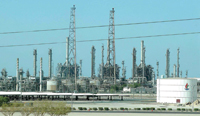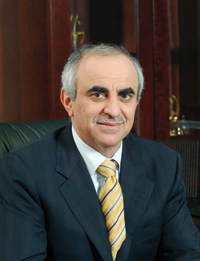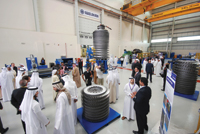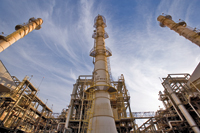
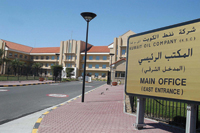 KOC ... looking for alternative sources
KOC ... looking for alternative sources
AT 2.9 million barrels per day (mbpd), Kuwait’s current oil production is approaching its capacity, state Kuwait Petroleum Corp (KPC) chief executive Farouk Al Zanki says.
Al Zanki’s statement indicates that Kuwait has little room to increase output should Iran make good on its threat to cut oil exports to European countries within days, ahead of an EU oil embargo slated to go into effect July 1.
Kuwaiti officials this year have variously put capacity between 3 mbpd and 3.3 mbpd, including the Neutral Zone split evenly with Saudi Arabia. The higher figure could only be maintained over a relatively short period of time, International Oil Daily understands. Upstream subsidiary Kuwait Oil Co (KOC) maintained output at just over 3 mbpd in a day-long test in 2010.
Kuwait is also weighing options for what it would do if traffic through the Strait of Hormuz is closed or disrupted. Unlike other Mideast Gulf producers, Kuwait does not have other export routes, and while Al Zanki told reporters on the sidelines of a conference in London that a KPC team was working on alternative solutions, he had “no idea” what these may be.
Kuwait is currently working toward a goal of increasing capacity to 4 mbpd by 2020 and maintaining that level through 2030. For that 1 mbpd incremental increase, KOC will rely on heavy oil projects, new output from discovered but not developed fields, and condensate from nonassociated gas developments.
Regarding outside help on heavy oil developments, Al Zanki says KOC had “made big progress” in its talks on an enhanced technical service contract with one international oil company but that nothing had been finalised.
Total and ExxonMobil have been in talks for years to help Kuwait develop its heavy oil assets, but upstream projects in Kuwait are complicated by a constitutional prohibition on foreign ownership of oil concessions.
In September a KPC official said the political environment was too contentious for a plan as complex as Exxon’s, which included a downstream joint venture to manufacture and sell steam.
KPC has not yet completed its negotiations with France’s Total to bring the company in on its $9 billion refinery and petrochemical joint venture with state-run Sinopec in China’s southern Guangdong province. As Kuwait ups capacity its crude output will become increasingly heavy, and KPC has refinery joint ventures designed to process this crude in the works in China, Vietnam and Indonesia.
Total has “already accepted, they are now advancing with ... this understanding,” Al Zanki says of the Zhanjiang complex in China. “It hasn’t been done yet but I think it will be soon hopefully,” he adds. The entire complex will include a 300,000 bpd refinery and 1 million tonne per year ethylene unit.
Al Zanki said the per cent stake taken by Total has not yet been decided. Petrochemical giant Dow, which had previously been in talks with KPC to join the project, withdrew.










































































